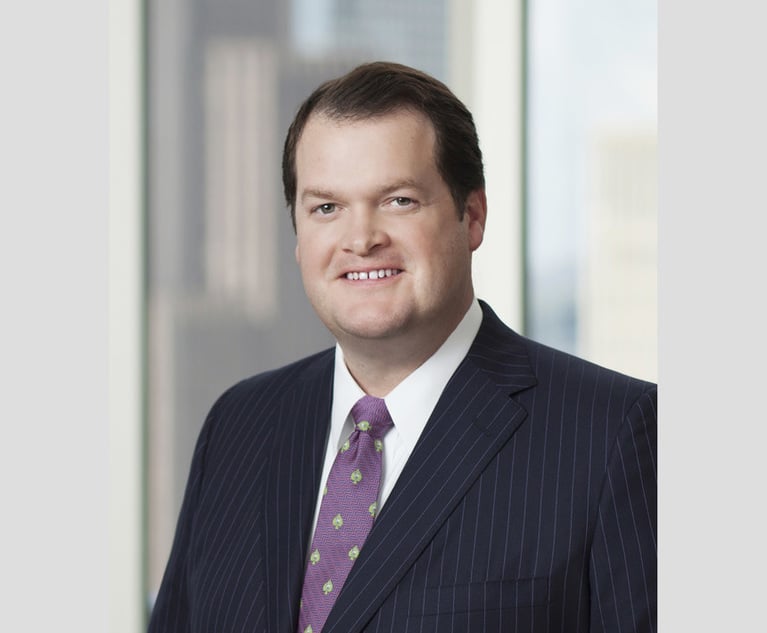Houston Attorney Wins Appellate Ruling Against 6 Ex-Clients, But Loses Separate Appeal Filed by 4,000 Other Ex-Clients
Both decisions center on George Fleming and his former law firm, which represented 8,051 clients who agreed to settle their claims against drugmaker Wyeth after using the prescription diet drug “fen-phen,” which caused heart problems.
December 27, 2018 at 06:33 PM
5 minute read
 George Fleming of Fleming, Nolen & Jez, Houston/courtesy photo
George Fleming of Fleming, Nolen & Jez, Houston/courtesy photo
Houston's Fourteenth Court of Appeals has affirmed a trial court judgment that a prominent plaintiffs attorney did not breach his fiduciary duty to six former clients by charging them unreasonable expenses in a $339 million settlement with a drug manufacturer.
However, the court ruled in a separate decision that the lawyer can't use that successful judgment to block similar claims filed against him by nearly 4,000 other former clients.
Both decisions center on George Fleming and his former law firm, Fleming & Associates, which represented 8,051 clients who agreed to settle their claims against drugmaker Wyeth after using the prescription diet drug commonly known as “fen-phen,” which caused heart problems.
After Wyeth and the Fleming firm signed a settlement for an aggregate amount of $339 million in 2006, a large number of former clients sued Fleming and his firm for breach of contract and breach of fiduciary duty. The clients alleged they had to pay a portion of the echocardiogram costs of all of the 40,000 potential clients the firm screened, a majority of whom failed the screening test and never asserted a claim against the drugmaker.
The trial court severed the claims of six clients, which proceeded to a jury trial. The jury ultimately ruled in Fleming's favor, finding he and his firm complied with their fiduciary duty and did not breach the clients' fee agreements by charging them unreasonable expenses.
After the trial judge signed a take-nothing judgment in that case, Fleming appealed the decision to the Fourteenth Court. And in a recent decision in Harpst v. Fleming, the Fourteenth Court affirmed the defense judgment, rejecting five separate appellate points raised by the plaintiffs.
Based on the successful verdict in the Harpst case, Fleming also moved for summary judgment to dismiss the claims of the nearly 4,000 former clients who also sued the lawyer and the firm. Fleming asserted affirmative defenses of collateral estoppel, waiver and release.
The trial court approved the summary judgment motion, a decision the plaintiffs also appealed to the Fourteenth Court.
But that separate appeal did not go Fleming's way as the Fourteenth Court ruled in Wilson v. Fleming that the judgment in Harpst could not be used by Fleming as affirmative defenses of collateral estoppel, waiver and release to the claims asserted by thousands of other former clients in Wilson.
Among other things, the Fourteenth Court noted that Fleming had not offered certified copies of the jury verdict and judgment in Harpst as evidence of collateral estoppel in Wilson.
“Thus, the evidence was incompetent and cannot support summary judgment,” Justice Kevin Jewell wrote. “Because these exhibits were the only evidence the Fleming Firm offered to establish its collateral estoppel defense, the summary judgment cannot rest on that ground.''
The court also ruled that Fleming was not entitled to summary judgment based on the argument that the thousands of former clients in Wilson expressly waived claims against the lawyer and his firm under the terms of their settlement agreements.
“Whether appellants are entitled to summary judgment on the question, or whether a jury must determine whether appellants expressly waived their claims, are matters the trial court may consider on remand,” Jewell wrote in a decision that reverses and remands the case to the trial court for further consideration.
The court also agreed with the plaintiffs' argument that the trial court erred by granting summary judgment based on the basis of Fleming's argument that the former clients had signed releases in which they pledged not to sue him or his firm.
“The Fleming Firm made no attempt in its motion for summary judgment to rebut the presumption of invalidity or unfairness by demonstrating that the releases were fair and reasonable,” Jewell wrote. “Though the firm raises several arguments on appeal in an attempt to buttress its release defense, it did not do so in the trial court, and a motion for traditional summary judgment must stand or fall on its own merit.”
Paul Kirklin, a Houston attorney who represents Fleming's former clients in both appeals, said he was encouraged the Fourteenth Court ruled that the judgment in the Harpst case cannot be used to win a summary judgment to dismiss nearly 4,000 claims filed by former clients in the Wilson case.
“They'll never get defensive collateral estoppel because the trial judgment cannot be extended to the Wilson plaintiffs. The Harpst judgment cannot be extended to the Wilson plaintiffs because the Wilson plaintiffs were not the litigants in the Harpst case,” Kirklin said. “This is not a class action case. And we obtained some favorable findings in the Wilson opinion and they will be very helpful to us in the remaining cases.''
Murray Fogler, a Houston attorney who represents Fleming and his former firm in both appeals, said his clients will pursue a motion for rehearing in Wilson before the Fourteenth Court. He declined to comment on the rulings.
Fogler noted that the motion for rehearing will be complicated by the fact that two of the justices who sat on the three-member panel that decided Wilson—Republican Justices Marc Brown and Brett Busby—both lost their seats in a Democratic sweep of the Fourteenth Court during the 2018 General Election.
“We're not exactly sure how this is going to work. Presumably, the chief justice will appoint two new members of the court. It could be two of the new Democrats or two of the existing Republicans,” Fogler said. “It could be random, we don't know how it's going to work. We're in uncharted territory here.''
This content has been archived. It is available through our partners, LexisNexis® and Bloomberg Law.
To view this content, please continue to their sites.
Not a Lexis Subscriber?
Subscribe Now
Not a Bloomberg Law Subscriber?
Subscribe Now
NOT FOR REPRINT
© 2025 ALM Global, LLC, All Rights Reserved. Request academic re-use from www.copyright.com. All other uses, submit a request to [email protected]. For more information visit Asset & Logo Licensing.
You Might Like
View All
Supreme Court Reinstates Corporate Disclosure Law Pending Challenge



Supreme Court Considers Reviving Lawsuit Over Fatal Traffic Stop Shooting
Trending Stories
- 1Gibbons Reps Asylum Seekers in $6M Suit Over 2018 ‘Inhumane’ Immigration Policy
- 2DC Judge Chutkan Allows Jenner's $8M Unpaid Legal Fees Lawsuit to Proceed Against Sierra Leone
- 3Internal Whistleblowing Surged Globally in 2024, so Why Were US Numbers Flat?
- 4In Resolved Lawsuit, Jim Walden Alleged 'Retaliatory' Silencing by X of His Personal Social Media Account
- 5Government Attorneys Face Reassignment, Rescinded Job Offers in First Days of Trump Administration
Who Got The Work
J. Brugh Lower of Gibbons has entered an appearance for industrial equipment supplier Devco Corporation in a pending trademark infringement lawsuit. The suit, accusing the defendant of selling knock-off Graco products, was filed Dec. 18 in New Jersey District Court by Rivkin Radler on behalf of Graco Inc. and Graco Minnesota. The case, assigned to U.S. District Judge Zahid N. Quraishi, is 3:24-cv-11294, Graco Inc. et al v. Devco Corporation.
Who Got The Work
Rebecca Maller-Stein and Kent A. Yalowitz of Arnold & Porter Kaye Scholer have entered their appearances for Hanaco Venture Capital and its executives, Lior Prosor and David Frankel, in a pending securities lawsuit. The action, filed on Dec. 24 in New York Southern District Court by Zell, Aron & Co. on behalf of Goldeneye Advisors, accuses the defendants of negligently and fraudulently managing the plaintiff's $1 million investment. The case, assigned to U.S. District Judge Vernon S. Broderick, is 1:24-cv-09918, Goldeneye Advisors, LLC v. Hanaco Venture Capital, Ltd. et al.
Who Got The Work
Attorneys from A&O Shearman has stepped in as defense counsel for Toronto-Dominion Bank and other defendants in a pending securities class action. The suit, filed Dec. 11 in New York Southern District Court by Bleichmar Fonti & Auld, accuses the defendants of concealing the bank's 'pervasive' deficiencies in regards to its compliance with the Bank Secrecy Act and the quality of its anti-money laundering controls. The case, assigned to U.S. District Judge Arun Subramanian, is 1:24-cv-09445, Gonzalez v. The Toronto-Dominion Bank et al.
Who Got The Work
Crown Castle International, a Pennsylvania company providing shared communications infrastructure, has turned to Luke D. Wolf of Gordon Rees Scully Mansukhani to fend off a pending breach-of-contract lawsuit. The court action, filed Nov. 25 in Michigan Eastern District Court by Hooper Hathaway PC on behalf of The Town Residences LLC, accuses Crown Castle of failing to transfer approximately $30,000 in utility payments from T-Mobile in breach of a roof-top lease and assignment agreement. The case, assigned to U.S. District Judge Susan K. Declercq, is 2:24-cv-13131, The Town Residences LLC v. T-Mobile US, Inc. et al.
Who Got The Work
Wilfred P. Coronato and Daniel M. Schwartz of McCarter & English have stepped in as defense counsel to Electrolux Home Products Inc. in a pending product liability lawsuit. The court action, filed Nov. 26 in New York Eastern District Court by Poulos Lopiccolo PC and Nagel Rice LLP on behalf of David Stern, alleges that the defendant's refrigerators’ drawers and shelving repeatedly break and fall apart within months after purchase. The case, assigned to U.S. District Judge Joan M. Azrack, is 2:24-cv-08204, Stern v. Electrolux Home Products, Inc.
Featured Firms
Law Offices of Gary Martin Hays & Associates, P.C.
(470) 294-1674
Law Offices of Mark E. Salomone
(857) 444-6468
Smith & Hassler
(713) 739-1250






